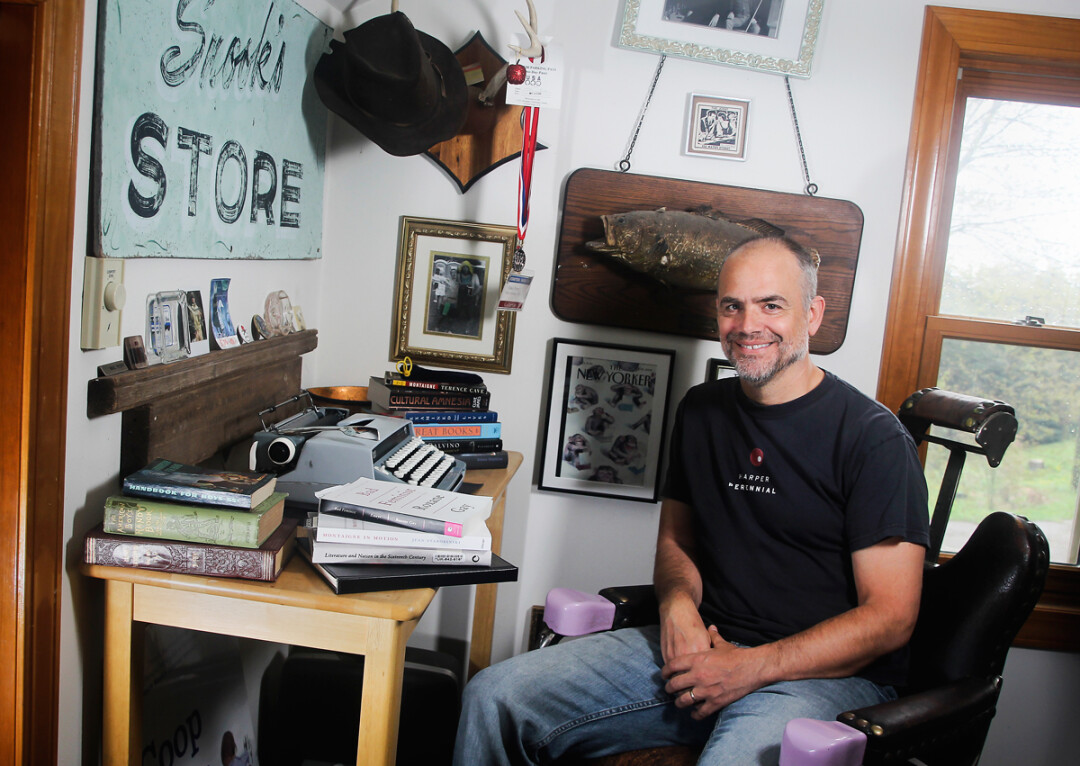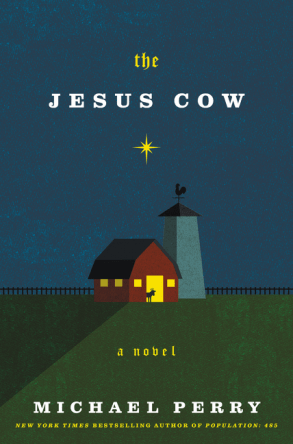A Series of Adventurous Flops
a look behind the scenes of Michael Perry’s first adult fiction novel, The Jesus Cow
Rob Reid, photos by Andrea Paulseth |

Michel Perry’s newest book, The Jesus Cow, is his first adult novel and features a bachelor farmer named Harley Jackson. Harley lives in a northern Wisconsin village called Swivel, not too far north of the university town Clearwater (that’s right, Clearwater) and even closer to the small town of Boomler (that’s right, Boomler). Harley has to deal with the fact that his cow named Tina Turner (that’s right, Tina Turner) has given birth to a calf with the image of Jesus on its side on Christmas Eve.
“This was a stylized Jesus,” Perry writes, “rendered in black-and-white splotches like clip art from the cover of a 1970s family-planning brochure, but immediately recognizable as the standard doe-eyed Lutheran hippie iteration.”
Harley’s friend Billy says, “Get a lawyer. And start printin’ T-shirts.” Harley tries to keep it quiet, knowing that once word gets out, it will attract too much attention for his liking. Word does get out when the mail carrier sees the calf and sends an image of it throughout social media. Soon, there is a stampede of the faithful entering Harley’s small farm. The rest of this novel explores various aspects of rural life, relationships, and, of course, faith. While the Fall Creek-based author is best known for his nonfiction memoirs, his debut novel has already garnered a starred review from Library Journal and a thumbs-up from Booklist Magazine. – Rob Reid
 Volume One: Did you have any qualms about tackling religion in your book?
Volume One: Did you have any qualms about tackling religion in your book?
Michael Perry (Without pause): Yes! I’m pretty nervous. I don’t want people to think I’m making fun of religion. I was raised not to take the Lord’s name in vain. It was a balancing act writing the book, trying to be honest about being agnostic but still having a deep respect for those who believe. A couple of my characters are patterned after three elders in my life who are devout Catholics. I watched how they live. They do good work quietly. The book is dedicated to “the quiet ones.” This covers both believers and non-believers. I’m probably most nervous about the title, which the publisher chose, even though it was my working title. In the end, I hope folks will remember that this is a comic novel.
Do you remember when you first got the idea for this book?
The idea has been percolating for over 10 years. I always wanted to write a story about water towers and unusual cows.
What are the similarities between writing fiction and nonfiction?
The research aspect of writing is similar. For example, I had to research how much pump pressure is required to move fluids a certain level. And trying to get the observational element right. There’s one scene where Harley sees a woman’s pickup truck at the local Kwik Pump and is very excited to notice it’s a “well-worn Ford F-250. Red, with plow mounts. A beefy four-wheeled drive but fitted with narrow tires, smart for the snow. A set of tire chains hung from the headache rack.” Some readers will understand the significance of this, they will get it. The biggest problem with fiction is plot. I have to ask would this really happen? I used to tease my fiction author friends about listening too much to their characters, and yup, that’s what happened to me. The nonfiction memoir writer side of me can actually see the town from the top of the water tower or go to the gas station to get that preferred cup of coffee. The fiction part is when the characters just react.
You have several well-rounded female characters who defy typical roles. Carolyn is basically a defrocked professor from the local university who is trying to elevate the quality of life for her new neighbors but only succeeds in violating the law. Meg owns a salvage yard, drives a tow truck, and is a devote Christian who is not the least bit interested in visiting the Jesus Cow. Mindy is new to town and wants to learn about raising beefers. She jokingly asks Harley that since he is a “husbandman” (a farmer), can she be a “wifewoman” if she acquires some beefers? She also has a knack for knowing when to end a relationship with a guy by the way he smells. Maggie, from your young person novel The Scavengers, was also a strong female protagonist. Is this a conscious aspect of your writing?
Yes, I was raised by strong women, I live with strong women, and this is very natural for me. I want to give voice to them while at the same time I’m leery about carrying a torch for a cause. It’s a privilege of mine to be able to share things I care about, and that includes these characters. I got a lot of help from fiction writer Dean Bakopoulos who read what I wrote about the character of Carolyn. He pointed out that she needed an empathetic side. I realized that he was right, that I previously only had her there for comic relief.
You quote both Waylon Jennings and Ray Wylie Hubbard in the book. They seem to be the musical soundtrack of the story. You also write and perform songs. Does music play a big role in your writing?
I never use stimulants except for caffeine, refined sugar, and music. Music plays a big part of writing. Sometimes I listen to classical music, sometimes Pink Floyd’s Dark Side of the Moon. I’m really influenced by singer/songwriters and that’s where Waylon and Ray Wylie Hubbard come in, especially Ray. I’ve never met him but I’ve talked to his wife and would love to meet him someday. His music is important to me and this is a way for me to share him with my readers.
What’s your current writing routine and list of projects?
My writing routine is based on triage: Do what has to be done. I’m currently working on an article about tinnitus for Men’s Health magazine. I write a weekly radio show, I have deadlines for a newspaper column, book deadlines (the sequel to The Scavengers and a nonfiction book about the essays of Montaigne), and 60-100 road dates a year. I’ve learned to write just about anywhere. My favorite place, though, is at home. Get up, feed the chickens, walk across the yard and go to work.
One last question. Are there aspects of you in protagonist Harley?
Superficially, there are aspects of Harley in me. For both of us, there have been moments when life has been a series of adventurous flops. We’re both frequently disgusted with ourselves for our being so wishy-washy. We both like to drive pickups while eating gas station pastries. And we both see people better than ourselves and wonder how they do it.
Jesus Cow: a biased ‘review’ by an unabashed fan
by Rob Reid
I first heard about Mike Perry when I read a Leader-Telegram article years ago about a young local who wrote a series of stories about the denizens of Foggy Crossing and sold them as a spoken word cassette titled Never Stand Behind a Sneezing Cow. I listened to it and thought it was quaint, in the style of Garrison Keillor and Tom Bodette. Then Population: 485 came out and Mr. Perry blew Keillor and Bodette out of the water. Since then Mike has written three more memoir-style books, a collection of short pieces, hundreds of journal articles and columns, radio pieces, a children’s dystopian novel, and now, an adult comic novel.
The Jesus Cow is Michael Perry at his best. In other words, the book contains delicious sentences that dance on one’s tongue, words sprinkled throughout that send even college English majors scrambling for a dictionary, well-rounded likeable characters warts-and-all who connect with readers in many different ways, and small observations of the world around us that probably elude us until Mike puts the spotlight on them. The Jesus Cow also showcases Mike’s great talent for juggling broad comedy with descriptions of heart-wrenching, emotional incidents that explore the very core of what it is to be human. Few writers can pull this off, and fewer can do it book after book.
OK, this isn’t so much of a book review as it is an admiration for a local author who has more talent in his typing fingers than 99.9 percent of the human population.
And I thank him for that.






















